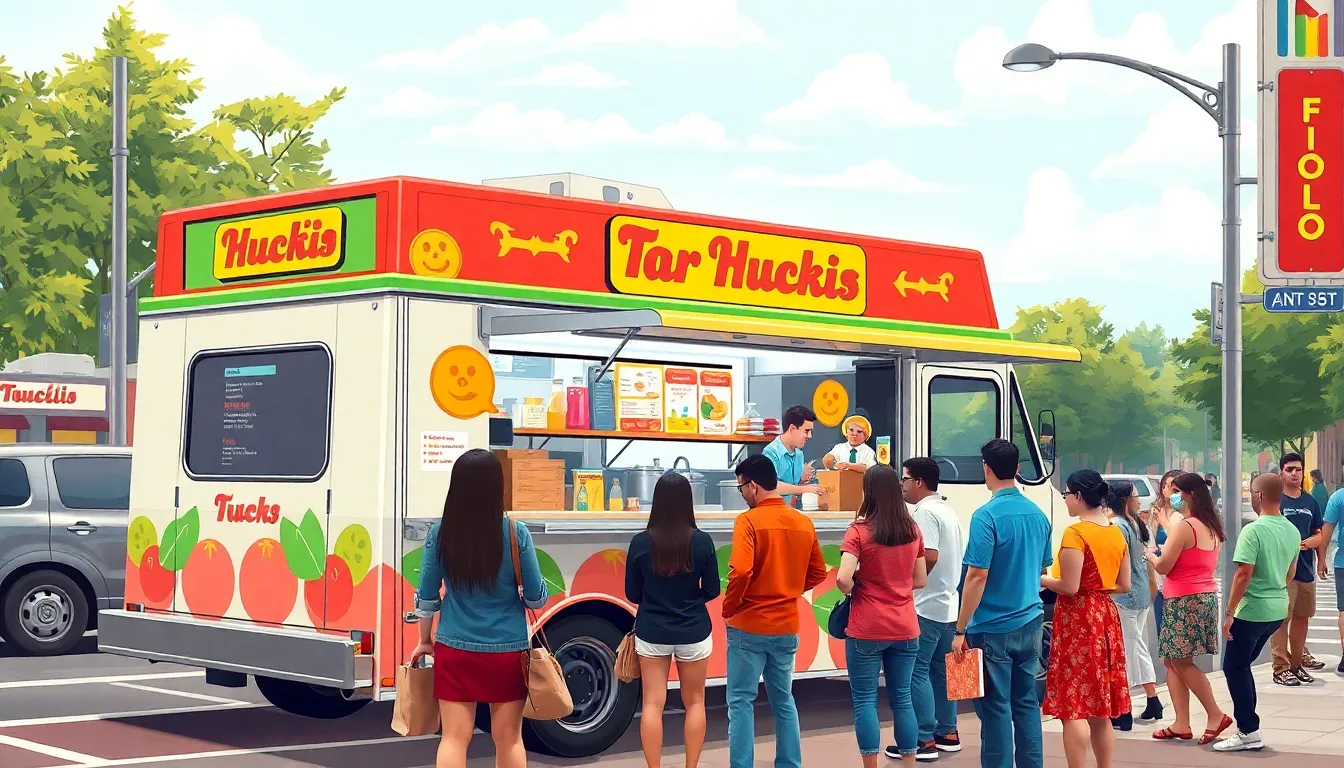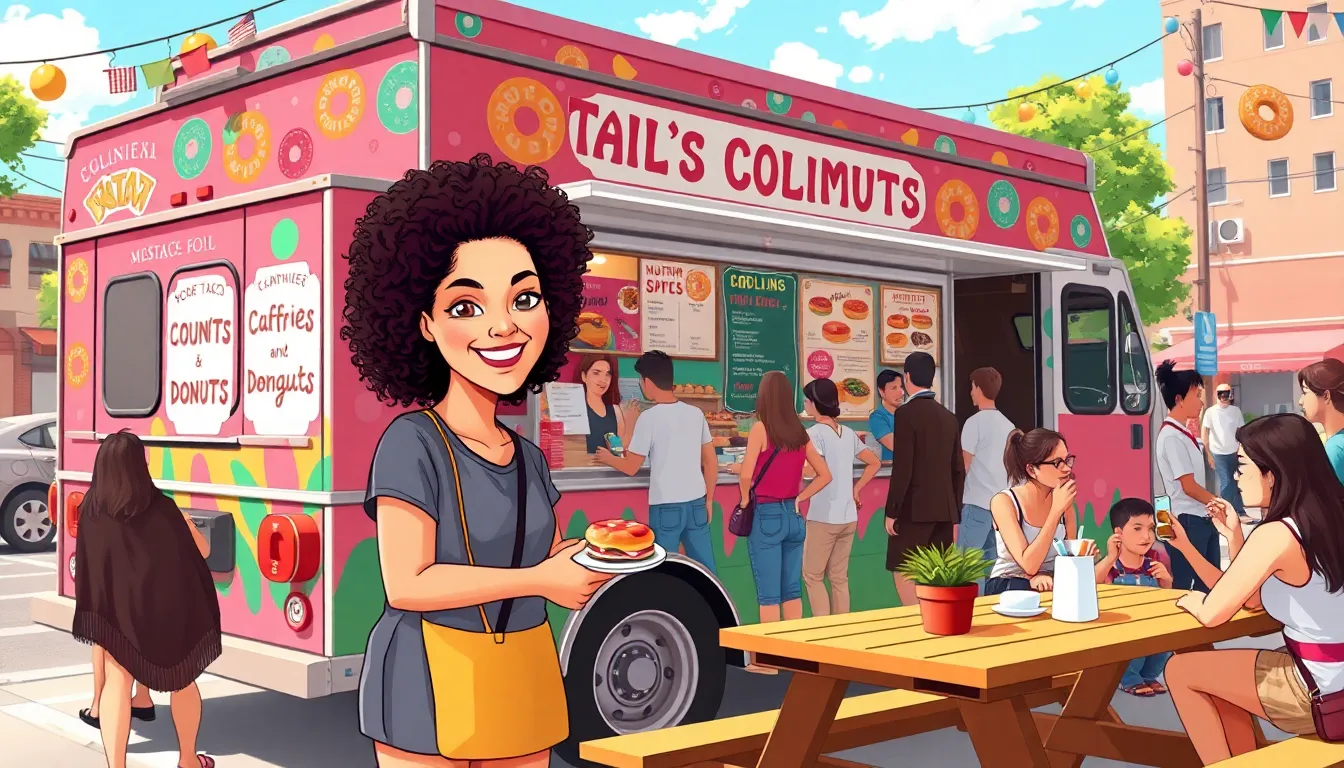Food trucks have rolled into the culinary spotlight, serving up everything from gourmet tacos to artisanal donuts. These mobile kitchens are more than just a trend; they’re a delicious revolution that’s transforming how people eat on the go. With their vibrant colors and enticing aromas, food trucks have become the ultimate foodie playground, drawing in crowds eager to sample innovative dishes that push the boundaries of traditional street food.
Table of Contents
ToggleCurrent Food Truck Trends
Food trucks continue to evolve, showcasing diverse culinary offerings and unique experiences. Current trends reflect consumer preferences for flavorful, high-quality meals on the move.
Popular Cuisines
Food trucks feature an array of popular cuisines, with Mexican, Asian, and Mediterranean topping the list. Mexican food trucks serve gourmet tacos, burritos, and quesadillas, providing fresh ingredients and bold flavors. Asian options include Korean BBQ and sushi rolls, appealing to those craving both traditional and fusion dishes. Mediterranean trucks offer flavorful gyros and falafels, often paired with fresh vegetables and tangy sauces. These varied cuisines cater to diverse palates and create vibrant food scenes.
Innovative Menus
Innovative menus set food trucks apart, highlighting creativity and culinary experimentation. Many trucks blend global cuisines, such as Thai-inspired mac and cheese or Indian-style tacos, enticing adventurous eaters. Seasonal ingredients drive menu changes, with rotating items that reflect local harvests. Health-conscious options also emerge, including vegan, gluten-free, and organic dishes, appealing to health-focused consumers. Customization plays a key role, allowing patrons to tailor meals to their preferences. These innovative approaches keep food truck offerings fresh and exciting, attracting repeat customers.
Technology’s Impact on Food Trucks

Technology plays a crucial role in shaping food truck operations and customer engagement.
Online Ordering and Delivery
Online ordering systems streamline the process for food trucks, allowing customers to place orders through dedicated apps or websites. Many food trucks utilize platforms such as Square and Grubhub to enhance convenience. Advanced scheduling and real-time tracking improve the customer experience, ensuring accurate timing and reducing wait times. With the growing demand for delivery, food trucks frequently partner with delivery services to expand their reach, catering to busy clients seeking quick, quality meals. Recent data indicates that food trucks leveraging online ordering experience up to a 30% increase in sales, highlighting the importance of adopting digital solutions in a competitive market.
Social Media Marketing
Social media serves as a powerful tool for food trucks to engage with their audience. Platforms like Instagram and Facebook allow food trucks to showcase their unique offerings through vibrant images and videos. Regular posts featuring behind-the-scenes content and interaction with customers enhance brand loyalty. Social media also enables food trucks to announce daily locations and special promotions, drawing in more patrons. Statistics show that food trucks actively posting on social media can see a growth of 20-50% in foot traffic. Employing targeted advertisements further boosts visibility, attracting new customers and retaining existing ones.
Sustainability in Food Truck Operations
Sustainability plays a vital role in modern food truck operations, addressing environmental concerns while enhancing customer appeal. Food trucks increasingly implement eco-friendly strategies to operate successfully.
Eco-Friendly Practices
Food trucks adopt various eco-friendly practices to minimize waste and reduce carbon footprints. Many use biodegradable containers, utensils, and napkins to eliminate single-use plastics. Solar panels power some trucks, harnessing renewable energy. Water-saving techniques like low-flow faucets contribute to sustainability. Regular carbon footprint assessments enable food trucks to monitor and refine their environmental impact, promoting greener operations that attract eco-conscious diners.
Locally Sourced Ingredients
Locally sourced ingredients form a cornerstone of sustainable food truck operations. Trucks partner with regional farms and producers to provide fresh, seasonal offerings. This commitment reduces transportation emissions while supporting local economies. By using organic vegetables, grass-fed meats, and artisanal bread, food trucks enhance flavor and nutritional value. Sourcing locally also resonates with consumers who prioritize sustainability, reinforcing brand loyalty and boosting community connections.
Challenges Facing Food Truck Owners
Food truck owners encounter various challenges that can impact their operations and profitability. Understanding these obstacles is essential for success in the competitive food truck industry.
Regulatory Hurdles
Regulatory hurdles pose significant obstacles for food truck owners. Local governments often impose specific licensing, health department permits, and zoning regulations that vary by location. Some cities require food trucks to secure permits for specific neighborhoods, limiting their operating areas. Compliance with health and safety standards demands rigorous inspections, contributing to additional costs and administrative work. Navigating these regulations often entails substantial time investment, which can divert focus from culinary innovation and customer engagement.
Competition from Restaurants
Competition from restaurants remains a considerable challenge for food truck owners. Established eateries with fixed locations often benefit from brand recognition and loyal customer bases. Many restaurants also adapt by incorporating food truck-style menus or hosting food trucks at their locations to draw in patrons. This trend intensifies competition for food truck owners, especially in popular dining districts. Additionally, cost differences such as rent and staffing allow traditional restaurants to offer competitive pricing, which can erode food truck profit margins. Food trucks must consistently deliver unique offerings and superior customer experiences to stand out in this crowded marketplace.
Food trucks continue to revolutionize the dining experience with their diverse offerings and innovative approaches. As they adapt to consumer preferences for high-quality meals on the go, these mobile kitchens are redefining street food culture. The integration of technology enhances customer engagement and streamlines operations, while a commitment to sustainability resonates with eco-conscious patrons.
Despite facing challenges like regulatory hurdles and stiff competition, food trucks that prioritize unique menus and exceptional service can thrive in this dynamic market. With their vibrant presence and creative culinary options, food trucks are set to remain a beloved fixture in the culinary landscape.



